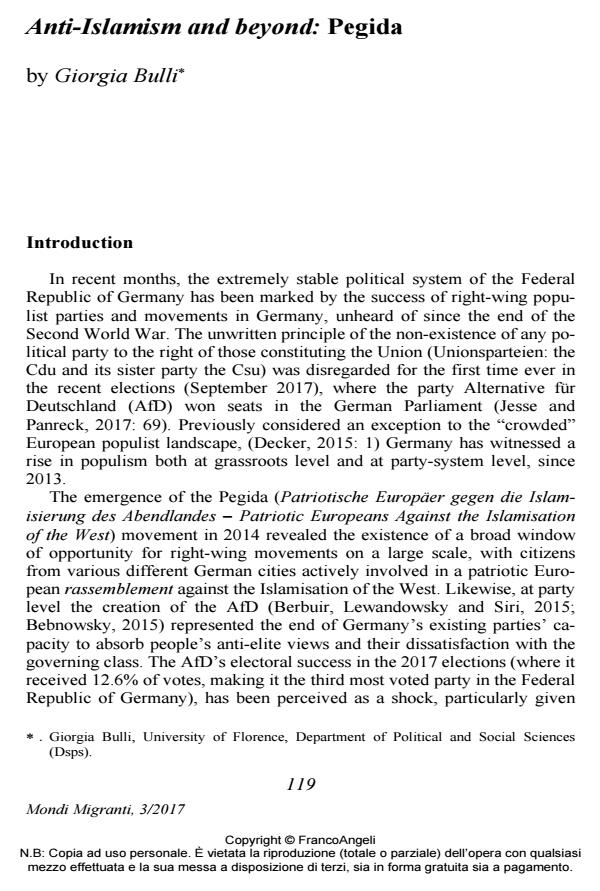Anti-Islamism and beyond: Pegida
Titolo Rivista MONDI MIGRANTI
Autori/Curatori Giorgia Bulli
Anno di pubblicazione 2018 Fascicolo 2017/3
Lingua Inglese Numero pagine 17 P. 119-135 Dimensione file 211 KB
DOI 10.3280/MM2017-003006
Il DOI è il codice a barre della proprietà intellettuale: per saperne di più
clicca qui
Qui sotto puoi vedere in anteprima la prima pagina di questo articolo.
Se questo articolo ti interessa, lo puoi acquistare (e scaricare in formato pdf) seguendo le facili indicazioni per acquistare il download credit. Acquista Download Credits per scaricare questo Articolo in formato PDF

FrancoAngeli è membro della Publishers International Linking Association, Inc (PILA), associazione indipendente e non profit per facilitare (attraverso i servizi tecnologici implementati da CrossRef.org) l’accesso degli studiosi ai contenuti digitali nelle pubblicazioni professionali e scientifiche.
The name Pegida (Patriotische Europäer gegen die Islamisierung des Abendlandes) stands for "European Patriots against the Islamisation of Europe". The movement, created in October 2014, mobilizes on the cry of anti-immigration and anti-elite slogans. Initially joined by a few thousand people in the city of Dresden, the weekly rallies held every Monday reached 25.000 participants at the beginning of 2015 in Dresden, currently gathering 2-3.000 people every Monday. Anti-immigration stances, notably the anti-Islamic positions already evoked by the movement’s name, represent a very important part of the ideology and rhetoric of Pegida’s mobilization and success, albeit not the only one. The origins of Pegida, the composite nature of its sympathiser and participants, Pegida’s rich symbolic apparatus, all point to a structured system of recurrent, cross-cutting, reciprocal reinforcing factors. Their unifying features consist on the one hand in frustration with the unfulfilled promises of democracy - a characteristic element of populist parties and movements - reinforced in the case of Pegida by the centrality of the Eastern variable - and on the other hand in the fears about the uncertainty and increasing segmentation of Western society and communities, which are perceived as being increasingly threatened by economic and cultural globalisation and economic insecurity. In this context, the trait d’union represented by the anti-Islamic and anti-immigration stances, is both a recognisable feature and acts as a means of garnering visibility and agreement at a time when anti-Islamism represents one of the core elements of populist right parties and movements.
Parole chiave:Social movement; populism; anti-immigration; anti-Islamism; anti-elitism; mobilization
- Humanitarian Help and Refugees: De-Bordering Solidarity as a Contentious Issue Maurizio Ambrosini, in Journal of Immigrant & Refugee Studies /2024 pp.517
DOI: 10.1080/15562948.2022.2059823 - The Urban Governance of Asylum as a “Battleground”: Policies of Exclusion and Efforts of Inclusion in Italian Towns Maurizio Ambrosini, in Geographical Review /2021 pp.187
DOI: 10.1080/00167428.2020.1735938
Giorgia Bulli, Anti-Islamism and beyond: Pegida in "MONDI MIGRANTI" 3/2017, pp 119-135, DOI: 10.3280/MM2017-003006